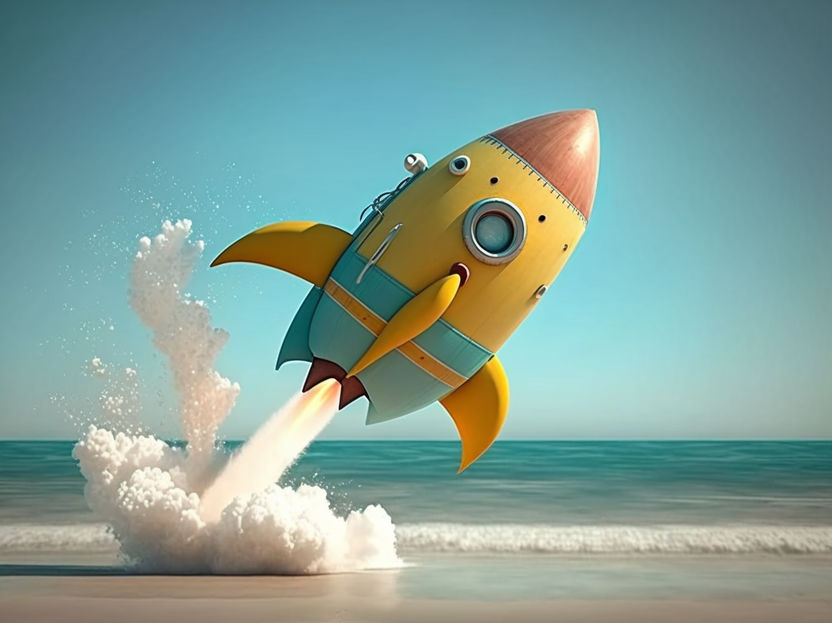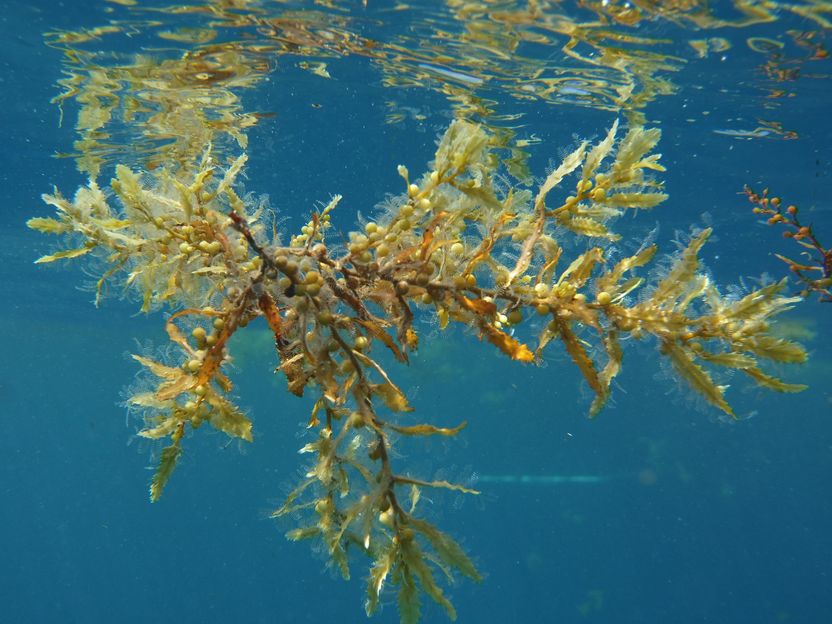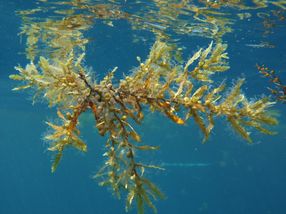New Start-up develops aquafarms for macroalgae
AWI and Carbonwave spin-off: Large algae simultaneously bind CO₂ and create raw materials for the chemical industry
Advertisement
The company MACROCARBON SL has just been founded in Las Palmas, on the Canary Islands. It is a spin-off from the Alfred Wegener Institute, Helmholtz Centre for Polar and Marine Research (AWI) and Carbonwave. The start-up is developing algae farms, in which the macroalgae Sargassum will be cultivated. These algae simultaneously bind large amounts of CO2 and produce new raw materials for the chemical industry.

Symbolic image
Computer-generated image

Makroalga Sargassum natans
Franziska Elmer


It all started with the idea of using natural ocean resources to develop new climate-friendly raw materials for industry. To this end, committed researchers from AWI, Carbonwave, GEOMAR, Helmholtz Centre for Ocean Research Kiel, and the start-up Seafields joined forces, with the support of BASF. In January 2022 they founded the project "C-CAUSE" (Chemical CARBON Utilization through Sargassum Economy). A short time later, in May 2022, they won a grant of 700,000 euros as part of the "Carbon to Value Challenge" of the Federal Agency for Disruptive Innovation (SPRIND).
In this first funding phase a novel value chain was developed: starting with the cultivation of free-floating macroalgae (Sargassum fluitans and natans) in open-ocean aquafarms, biological and renewable carbon feedstocks will be produced for the chemical industry. The goal is to contribute to the decarbonization of the chemical industry while creating products that store carbon over long time periods.
In order to drive further development activities in a second SPRIND funding phase and technical upscaling in an even more agile way, the company MACROCARBON SL was spun out of AWI and Carbonwave on March 23, 2023 and now has received further funding of 2.3 million euros from SPRIND to further develop its innovation. Regarding the goals of the AWI and Carbonwave spin-off, founder and MACROCARBON CEO Dr. Mar Fernández Méndez explains: "MACROCARBON will develop integrated supply chains for the cultivation and processing of Sargassum seaweed. Because Sargassum itself floats, we do not need expensive longlines to be stretched out in the water for this purpose. In addition, the algae grows quickly and thrives in many regions. It binds CO2 very efficiently through natural photosynthesis."
After harvesting the algae, the carbon-rich biomass will be processed into raw materials for the chemical industry (such as bio-naphtha), which will replace products previously derived from fossil fuels. In this way, MACROCARBON aims to contribute to decarbonization, sequestering 100 million tonnes of CO2 per year by 2040 and one gigatonne by 2050.
AWI, Carbonwave and its spin-off MACROCARBON plan to continue cooperating with each other. To this end, AWI will contribute its biological process understanding to monitor carbon fluxes and environmental sustainability, thus supporting MACROCARBON in building an innovative value chain. Carbonwave will develop processing methodologies based on their existing operations and production of valuable products from Sargassum in the Caribbean.
Las Palmas, on Gran Canaria, was chosen as the company's headquarters, mainly because its location in the subtropical Atlantic where Sargassum thrives well and because MACROCARBON has access to an ocean platform with a test environment (Oceanic Platform of the Canary Islands, PLOCAN) here. This platform is suitable for large-scale experiments and tests of pilot processing plants. The location in the Atlantic Ocean is also easy to reach and at the same time offers the necessary marine high seas conditions. The Canary Islands belong to the EU, which is relevant for SPRIND funding and possible further EU funding. Furthermore, they offer - especially in the context of the so-called Blue Bioeconomy - an attractive start-up "ecosystem".
In addition to the funding from SPRIND, the two companies Carbonwave and Seafields plan to participate in MACROCARBON. It is also expected that Jason Cole, currently Head of Innovation at Carbonwave, will join MACROCARBON's founding team. Seafields and Carbonwave are already involved in aquaculture and the utilization of Sargassum seaweed, respectively, and can contribute valuable experience to the company.
The AWI spin-off MACROCARBON was invited to present itself at the Investor Day of the four non-university research organizations Helmholtz, Max Planck, Fraunhofer and Leibniz in Munich at the end of March. At the event, 39 selected start-ups presented themselves in front of 100 investors. For MACROCARBON this was a very good opportunity to introduce itself to investors and to exchange ideas with other spin-offs from non-university research organizations. As the lively discussion following the MACROCARBON pitch and numerous inquiries from investors at the poster stand showed, the concept is extremely interesting, not only ecologically but also economically.
"For me as a marine biologist, this company foundation is a very exciting but also challenging process. I also learned a lot at this investor event," says Mar Fernández Méndez. "It's good that we are accompanied in this by a dedicated SPRIND coach and the AWI technology transfer office." She adds: "In its latest synthesis report, the Intergovernmental Panel on Climate Change again pointed out the great urgency to finally take action. This motivates me to move into broad commercial application by upscaling our research results."
Other news from the department business & finance
Most read news
More news from our other portals
Something is happening in the life science industry ...
This is what true pioneering spirit looks like: Plenty of innovative start-ups are bringing fresh ideas, lifeblood and entrepreneurial spirit to change tomorrow's world for the better. Immerse yourself in the world of these young companies and take the opportunity to get in touch with the founders.




















































